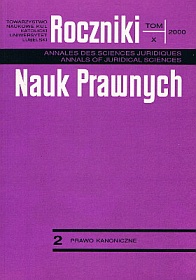Prawo kanoniczne na Uniwersytecie Jana Kazimierza we Lwowie w latach 1918-1939
Abstrakt
The subject of the paper is the history of the science of canon law and its teaching at the Jan Kazimierz University in Lvov in the period between the two world wars. At that time (in the Second Polish Republic) there were six universities: in Lublin (with an independent Faculty of Canon Law), Cracow, Vilnius, Poznan - where no Faculty of Theology had been established - and in Lvov. It should be reminded that at that time canon law was taught both at theological and law faculties. It seems justified to say that in the Lvov centre the standard of teaching canon law at the Faculty of Law was positively higher than that at the Faculty of Theology. At the latter Faculty, out of the four lecturers only Rev. Błażej Jaszowski and Rev. Michał Wyszyński did research into canon law. However, they only left an inconsiderable number of works; this was due, among other things, to the fact that the former of them died as soon as 1921. The standard of teaching was also negatively influenced by frequent changes in the syllabus as well as in the number of hours devoted to it.
Teaching canon law at the Faculty of Law looked a lot better. Almost throughout the whole period between the world wars a lecture was conducted by Władysław Abraham. Just a few years before the outbreak of World War II it was taken over by Leon Halban. Contrary to the Faculty of Theology classes in canon law as well as a regular seminar were conducted. In principle, the number of hours and the syllabus remained unchanged.
At the Lvov University a school of history of Church Law was started. Its founder and main representative was Władysław Abraham. In the seminar conducted throughout the period between the wars students participated who took over from their Master both the research interests and the basic methodological assumptions concerning research work. The works written there show certain common features that justify introduction of the term "the Lvov school of history of Church Law”. In Abraham’s seminar apart from students of law and history, also professors from other university centres participated.
When discussing the output of the school it should be mentioned that Abraham’s students undertook subjects that were close to the problems dealt with by the Professor. It appears that focussing attention on the beginnings of Christianity was not accidental, as the Polish State that was reborn in 1918 tried to reach back to the beginnings of its existence. A considerable number of these works that are still valid, are the most characteristic of the school because of the research method they used.
The dogmatic-legal current was much weaker in the research, as compared to the historicallegal one. The works written by the Lvov scholars on the then holding canon law most often had the shape of a commentary to those paragraphs of the public law that were interesting for the science of canon law.
In conclusion it should be said that the Lvov centre played an important role in the development of historical-legal sciences in the period of the Second Polish Republic. Owing to Władysław Abraham and his pupils history of canon law became one of the best described domains of history of law.
Copyright (c) 2000 Roczniki Nauk Prawnych

Utwór dostępny jest na licencji Creative Commons Uznanie autorstwa – Użycie niekomercyjne – Bez utworów zależnych 4.0 Międzynarodowe.


